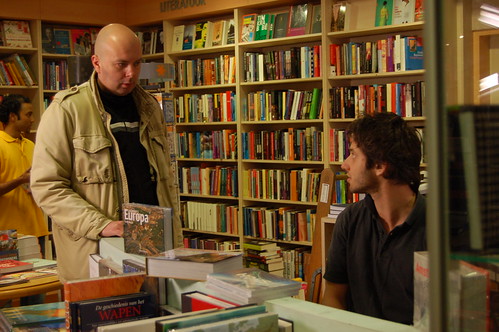Lastest Free Movie Making News
Bas Labruyère

Image by Verloren Jaren
Photography by Mick van Herk.
Watch te movie via www.lost-years.com
It’s December 2008. Only a few short months before, I had awakened from my long-lasting, first psychosis. I have just received a response to my request for the film academy to allow to graduate. Unfortunately, the current – and next – fourth year courses are fully booked, so there is no place for me (any more). When I was forced to terminate my studies at the Netherlands Film and Television Academy in 2006 (direction – fiction), they had expressed hope I would seek help. I refused for years, convinced that others were responsible for what was happening to me. Now I was receiving treatment from professionals at the Parnassia institute in The Hague, but it seemed like my career as a film-maker was doomed to failure.
Just before Christmas, my psychiatrist Wim Veling makes a proposal. The Parnasia First Pyschosis Centre was going to organise a national study day in May 2009. He suggests I might make a short documentary about having a first psychosis for the study day. I decide to discuss the proposal with my brother Robert, who graduated from the film academy with a degree in production. Why not use my own story for the documentary? The idea for the film ‘Lost Years’ was born. Production company JensenFrisbee was enthusiastic about producing the film.
Wim Veling and my social psychiatric nurse, Gertjan Meewis, were on board with the idea, and in the following months we started looking for funding. With an initial budget of 40,000 euros, that was going to take some time, so we gave up on trying to show the film during the study day. At the same time, I started writing a movie script. The basis for the screenplay was a letter I had sent my parents, telling them what I thought had happened to me in the past years.
In the late summer of 2009, we had only managed to raise half the necessary funds. At the time, we had the support of Stroom Den Haag, the Nuts Ohra Fund and Koningsheide Foundation. Five versions of the screenplay have been written. I want to create an authentic document of how I experienced my psychosis. This proved more difficult than expected. Additionally, the screenplay has grown from twenty to about fifty pages. Then we get some good news. Pharmaceutical company AstraZeneca is willing to finance the other half of the film. AstraZeneca also wants to show the film during the Netherlands Psychiatry Association’s spring conference on 14 April 2010.
Robert and I are happy, but – based on the version of the screenplay we have then – also a little worried. The project has grown from a simple docu-drama into a one-hour movie. We wonder if we shouldn’t look for additional financing first, a realistic option given the script. Shouldn’t we expand the project, turning it into a full-fledged 90 minute movie, and obtain proper funding? Because we are so enthusiastic about the project, we decide to go for it. We attempt to find additional funding, without any luck. I also make a final attempt at graduating from the film academy. Unfortunately, my idea to use the existing movie script and obtained funding to create a thesis film is not embraced by all.
Preproduction starts in late 2009. We have a movie script that is now seventy pages long, a forty thousand euro budget and a deadline on 14 April 2010. It turns into a guerrilla project, dependent on the goodwill of a large number of people. In subsequent months we assemble a fully-fledged crew, willing to work for peanuts, and a cast largely willing to act in return for a 10 euro expense fee.
After eight days of shooting, creating enough material for a 90 minute movie, three weeks of editing, and two and a half weeks of sound design, a 65 minute film is completed in early April 2010. On 14 April, ‘Lost Years’ premiered. From 15 April, it is available to view for free via www.lost-years.com.
